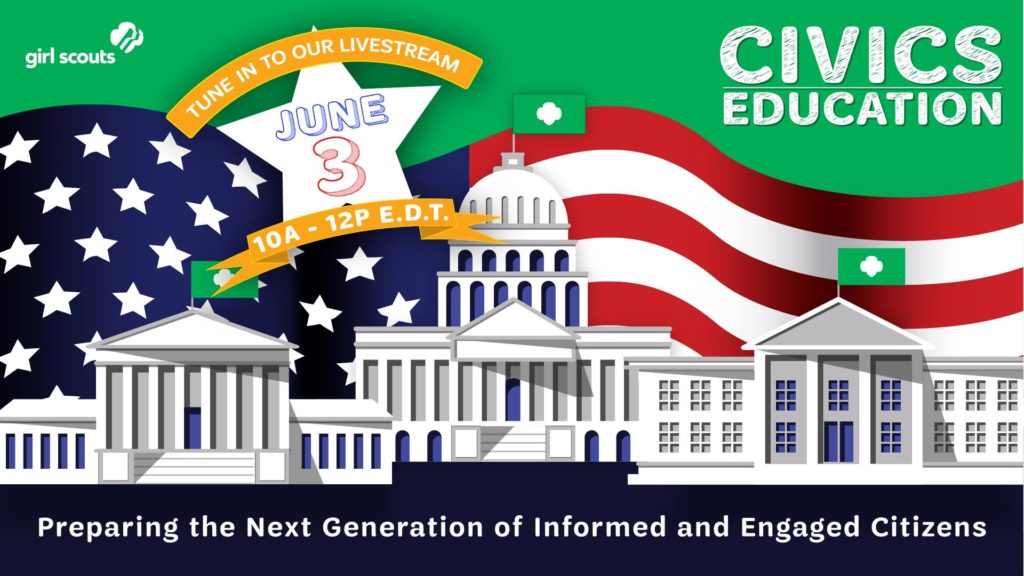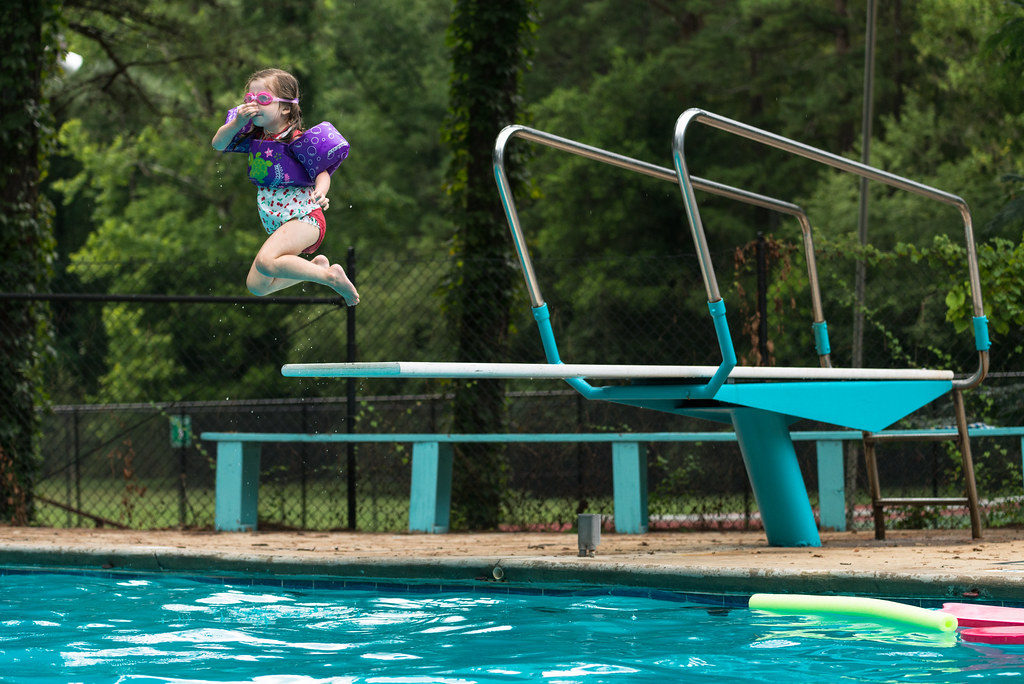We are republishing this post with permission and the original can be found here. Amy Brown is the author of the blog Girl Scout With a Cause.
 GSUSA has recently put a focus on bringing civics education to the forefront. On June 3rd, they hosted a webcast that was livestreamed entitled Civics Education: Preparing the Next Generation of Informed and Engaged Citizens. It’s described on GSUSA’s website as such: “This nonpartisan event is an opportunity for community leaders, public officials, and education experts to consider how out-of-school civics programs can prepare the next generation to be involved citizens with a deeper understanding of their government —both now and for the rest of their lives.” It’s archived on their website and can be found here: https://www.girlscouts.org/en/about-girl-scouts/advocacy/event-civics-education.html
GSUSA has recently put a focus on bringing civics education to the forefront. On June 3rd, they hosted a webcast that was livestreamed entitled Civics Education: Preparing the Next Generation of Informed and Engaged Citizens. It’s described on GSUSA’s website as such: “This nonpartisan event is an opportunity for community leaders, public officials, and education experts to consider how out-of-school civics programs can prepare the next generation to be involved citizens with a deeper understanding of their government —both now and for the rest of their lives.” It’s archived on their website and can be found here: https://www.girlscouts.org/en/about-girl-scouts/advocacy/event-civics-education.html
So how do we implement this within the Girl Scouts program? Well guess what? We have it RIGHT HERE at our fingertips! For both girls AND volunteers! It’s built into our own organization and spelled out in the Preamble of the GSUSA Constitution:
RESPONSIBILITY FOR THE MOVEMENT AND THE DEMOCRATIC PROCESS
The ultimate responsibility for the Girl Scout Movement rests with its members. We govern by an efficient and effective democratic process that demonstrates our leadership in a fast-changing world.
Where is this opportunity? It’s serving as a delegate on both the council and national level. What better way to educate and engage both adults and girls about civics and the democratic process than to do it within the framework of our organization! Or at least it used to be a way….
If you haven’t already, I ask that you read a previous blog post called What Happened to the Democratic Process in Girl Scouting? I go into more detail about what the democratic process is, why it’s important in Girl Scouting, and the signs and consequences if it isn’t implemented. What I wrote about sets up the rest of this post, so you might be missing something if you skip it.
This doesn’t apply to every council, of course, but there are a fair number that push delegates, which represent the volunteer and girl voice, to the side, whether it’s unintentional or by design. Or it’s given lip service, which is basically the same thing as ignoring it. Then we wonder why we don’t have a more engaged volunteer base that’s with us for the long haul. Why should they be when they’re disregarded?
It’s stressed in the webcast that education and discernment is critical in order for democracy to flourish. Is that happening in our organization? Many volunteers apply to be a National Delegate or are elected (or just do it because nobody else will) to be a delegate on the council level and have absolutely no idea what the position’s responsibilities are or what it entails. In many cases, even after starting their position, delegates and National Delegates aren’t educated about what they are really supposed to do, or if they do receive training, it’s very shallow and almost as an afterthought. It’s not emphasized that they are a critical part of the decision-influencing process and should take it seriously, nor do they understand how it fits within our Movement. They basically have a notion that they’re at an Annual Meeting just to listen to the board’s report and to trust that what they’re being told is in the best interest of the council. But isn’t this what is cautioned against in the webcast? A passive populace?

This isn’t all on the council leadership. ALL members, including volunteers and older girls, should understand that being a part of the Movement means we are responsible for it as stated in the Constitution’s preamble. Letitia James, Attorney General for the State of New York, reminds us in the webcast that democracy is not a spectator sport. If we’re not responsible for it, our program won’t continue, and it won’t be passed on to the next generation of girls. I think we all know the difference it can make in a girl’s life and in society.
In my previous post, I covered one part of the picture that I feel GSUSA needs to change, and that’s the governance related criteria used in a council’s Annual Review with GSUSA. There’s no measure regarding the membership being brought into the decision-influencing process. Since then, I found another very disturbing instance where the spirit of the democratic process has been effectively erased from our governance structure. Between these two things, it’s no wonder that many councils no longer look to delegates. And some may argue it’s been happening on the national level as well.
Before continuing, let’s revisit the definition of the democratic process found in the monograph Implementing the Democratic Process in Girl Scouting on pg. 9:
In Girl Scouting, the democratic process is defined as the various means of avenues through which the membership can influence decisions and activities in matters of governance (policy) or management (operations), and have access to those responsible for decision-making at the individual, troop/group, service unit, council, or national level.
In September of 2011, the Criteria and Standards for an Effective Girl Scout Council section in the 2009 edition of the Blue Book of Basic Documents was completely rewritten by the National Board, and the changes were published in the 2012 version of the Blue Book. Two direct mentions of the democratic process were removed from Criterion II:
(2009) Maintaining Organizational Integrity /Criterion II summary:
An effective Girl Scout council sustains the purpose of the Girl Scout Movement by conducting its business through the democratic process, consistent with the charter requirements, policies, and standards of Girl Scouts of the USA.
was changed to:
(2012 and current) Governance and Administration /Criterion II summary:
A chartered Girl Scout council advances the movement through strategic governance and leadership that employ effective systems and structures to deliver the Girl Scout mission.
Also,
(2009) Maintaining Organizational Integrity /Criterion II/Standard 4:
The council actively seeks to strengthen the democratic process to ensure that the membership is involved in direction setting and influencing major policy decisions.
became:
(2012 and current) Governance and Administration /Criterion II/Standard 2:
The council actively seeks to strengthen the stakeholder involvement and interaction to ensure that the membership is involved in influencing major policy decisions and helping to set strategic direction.
The phrase “the democratic process” is completely removed in Criterion II’s summary. In Standard 2, the wording is essentially the same, except that “the stakeholder involvement and interaction” is used in place of “the democratic process.”
Now you might be thinking I’m splitting hairs because “the stakeholder involvement and interaction” could match the definition of the democratic process for all intents and purposes. But like it or not, words have emotion behind them, and “the democratic process” is much more inspiring than “the stakeholder involvement and interaction.” Correct me if I’m wrong, but I don’t believe I heard the phrase “the stakeholder involvement and interaction” ever used in the GSUSA civics webcast. And even if you go with that terminology, when it comes to the GSUSA Annual Review criteria, it’s not even measuring how councils are strengthening any stakeholders other than the board of directors. And what if a council’s definition of “stakeholder” doesn’t include volunteers and girls? I know that sounds absolutely ridiculous at first glance, but the word stakeholder has a business connotation to it. Depending on who’s on your board, they might first think of donors and sponsors before the membership.

We are really missing a perfect opportunity to implement civics education using our organization’s governance as a springboard. If things are working as they should, older girls can experience, participate in, and learn about the democratic process through delegate meetings, Town Halls, Annual Meetings, and trainings all within a familiar context. Those skills can then be applied in the public arena. Are we talking out of both sides of our mouths when we push civics education and engagement to the public, but yet we have diminished the democratic process within our own organization? We say we don’t want the United States to have a mindless population, but yet we’re creating passive spectators within our own Movement. We say it’s dangerous for our country to have an uneducated and apathetic voting base, but isn’t that what’s happening with us when it comes to our delegations?
If you are someone who wishes that your council would make more of an effort to implement the democratic process and create more decision-influencing avenues, then just like what’s stressed in the webcast, you’ll have to educate yourself, speak up, and maybe even take some risks. I personally cannot stress the education part enough. Admittedly, there are many volunteers and girls who are very discouraged trying to make their voices heard. They may have attempted it already without much success or have dealt with some sort of retribution. A question was raised in the webcast that asked how to deal with discouragement when things don’t go your way. Chelsea Clinton said she liked to think of it as it’s not going your way – yet. She also said that sometimes you have to keep going to find out the reason why. Personally, the way I see it, if there is something you can do and it’s within your control, then if you don’t do it, you’ve guaranteed that it’s not going to happen. And remember that change doesn’t happen overnight. I have to remind myself of these things quite often.
I put forth some possible solutions to this issue in my previous blog post. Also this fall, my service unit is holding an event educating older girls (and adults) about governance by using the Girl Scout nonprofit framework as a model. This knowledge can be directly applied to civics education. If you’re interested in seeing our materials afterward, just let me know and I’ll be happy to pass them on.
Wondering where to start when it comes to learning about council governance? I’ve written a few posts about it. Another source is the website Girl Scout Governance. Right now it’s mostly about national governance, but there will be more information soon. In the meantime, there’s a discussion forum dedicated to Council Governance that you can participate in.
Does this really matter? Yes it does, because it’s not just about making sure our Movement continues on. It’s about creating opportunities to pass civics knowledge and experience on to girls who will take those skills and lead – both now and for the rest of their lives.
